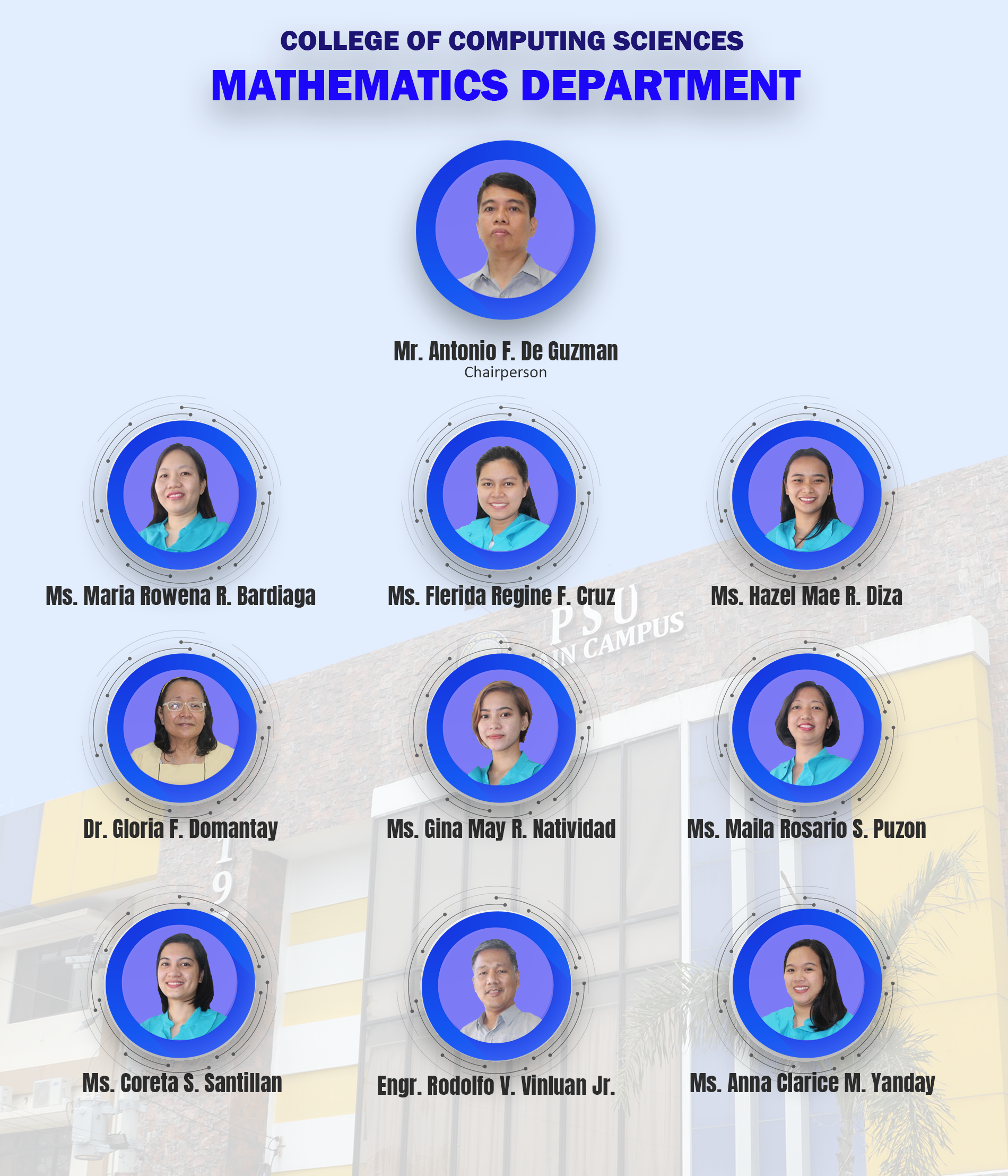

Welcome to MATH Department!
Bachelor of Science in Mathematics is a four-year degree program intended to give students a background in mathematical modeling, scientific computing, and the various modern applications of mathematics. In addition, the program covers major areas in pure mathematics supplemented by extensive exposure to mathematical applications in statistics and computer programming. More importantly, it teaches students the proper use of problem-solving approaches to explore and understand mathematical content and analyses mathematical statements and construct proofs/solutions.
The Bachelor of Science in Mathematics program at PSU Lingayen has produced quality and well-rounded students that can compete with the skills needed in the industry and academe. The program has congruency with the vision and mission of the institution and the Goals of the Academic Unit. It is designed, approved, and continuously developed, reviewed, and monitored in accordance with CHED order.
The participative effort of the stakeholders including the administration, faculty, students, alumni, and representatives is evident through curriculum review and enrichment. With these, the integration of recent trends is present and manifested by incorporating different subjects to address these, specifically in major subjects.
As the needs of the industry and academe keep changing, the department has grown to adapt to these demands by enhancing the education to the best quality we can offer. The program unceasingly sought accreditation and encourages its faculty members to undergo seminars and pieces of training to further hone their skills.
The Mathematics Department is unfailingly dedicated to bringing a better quality of education to its students who invested their growth in Pangasinan State University.
Organizational Chart

EMPLOYMENT OPPORTUNITIES
- Mathematician
- Statistician
- Researcher
- Instructor/Teacher
- Actuary
- Market Research Analyst
- Economist
- Software Engineer
- Financial Analyst
- Data Analyst
- To prepare student who plans to take immediately a math-oriented job and computer programming in business, industry or in the government.
- To prepare student who has plans to teach math and computer up to the junior undergraduate level.
- To prepare the student who plans to take up graduate studies either in math or in computer or in applied math or related fields
-
- Articulate the latest developments in their specific field of practice
- Effectively communicate orally and in writing using both English and Filipino languages
- Work effectively in multi-disciplinary and multi-cultural teams.
- Demonstrate professional, social, and ethical responsibility, especially in practicing intellectual property rights and sustainable development.
- Preserve and promote “Filipino historical and cultural heritage”
- Demonstrate broad and coherent knowledge and understanding in the core areas of physical and natural sciences
- Solve critical and problem solving skills using the scientific method
- Interpret relevant scientific data and make judgments that include reflection on relevant scientific and ethical issues
- Carry out basic mathematical and statistical computations and use appropriate technologies in (a) the analysis of data; and (b) in pattern recognition, generalization, abstraction, critical analysis and problem solving
- Communicate information, ideas problems and solutions, both, orally and in writing, to other scientists, decision makers and the public.
- Relate science and mathematics to the other disciplines
- Design and perform safe and responsible techniques and procedures in laboratory or field practices.
- Critically evaluate input from others
- Identify the limitations and implications of science in everyday life
- Commit to the integrity of data
- Gain mastery in the core areas of mathematics: algebra, analysis, and geometry.
- Develop and enhance perception of the vitality and importance of mathematics in the modern world including inter-relationship within math and its connection to other disciplines.
- Employ the concept and role of proof and reasoning and demonstrate knowledge in reading and writing mathematical proofs.
- Make and evaluate mathematical conjectures and arguments and validate their own mathematical thinking.
- Communicate mathematical ideas orally and in writing using clear and precise language.
